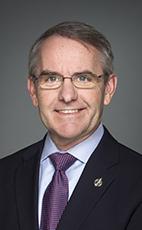The Chair would like to rule on the selection of report stage motions for Bill C-7, an act to amend the Public Service Labour Relations Act, the Public Service Labour Relations and Employment Board Act and other acts and to provide for certain other measures. Specifically I would like to address report stage Motions Nos. 1, 2 and 3, standing in the name of the hon. member for Saanich—Gulf Islands on the Notice Paper.
This being the first report stage debate of this Parliament, it affords the Chair an opportunity to remind the House of the Speaker’s role in selecting report stage motions, and the practice that guides it.
In deciding the matter, the Chair is bound by our established practice in relation to the Speaker's role at report stage.
A note to Standing Order 76.1(5) states:
The Speaker will not normally select for consideration by the House any motion previously ruled out of order in committee and will normally only select motions which were not or could not be presented in committee.
House of Commons Procedure and Practice, second edition, sets out the following general principle with respect to the selection of report stage motions. At page 783, it states:
As a general principle, the Speaker seeks to forestall debate on the floor of the House which is simply a repetition of the debate in committee […] the Speaker will normally only select motions in amendment that could not have been presented in committee.
On June 9, 2015, at page 14830 of Debates, the Speaker in the last Parliament referenced these passages. At the time, he said: “Both these excerpts point to an essential truth about report stage, namely that it is not meant to be another opportunity for detailed consideration of the clauses of a bill. For this reason, the Chair rigorously limits the types of motions that could be considered at report stage. In so doing, the Chair rests on the presumption that a committee's clause-by-clause consideration provides ample opportunity to scrutinize the clauses of the bill and have amendments considered accordingly”.
This principle continues to be applied with due regard to the particular circumstances of each case.
At the time that clause-by-clause occurred for Bill C-7, the committee had not yet adopted a mechanism to allow for the participation of members from non-recognized parties in committee. I am not certain, however, that the Chair would agree with the presumption that, in light of this, report stage would be the only vehicle available to these members to propose amendments to the bill.
Committees have shown great flexibility in the past in how they consider amendments at clause-by-clause. In describing this flexibility, we refer to the much repeated axiom: “Committees are masters of their own proceedings”.
With that said, Bill C-7 was one of the first bills to be considered in committee in the 42nd Parliament, and with committees still trying to determine how members from non-recognized parties could participate in committee proceedings on bills, a certain amount of flexibility is appropriate in this instance.
As such, I will allow the member for Saanich—Gulf Islands to move her Motions Nos. 2 and 3, even though they ought to have been moved in committee.
I would like her and all members to understand, however, that in the future, the Chair will be stricter in exercising his authority at report stage. Unless truly exceptional circumstances arise, the Chair will not select report stage motions that could have been moved in committee. I encourage all members to make efforts to have amendments dealt with in committee, so that report stage does not become a repetition of the committee clause-by-clause study of a bill.
Accordingly, Motions No. 1, 2, and 3 will be grouped for debate and voted upon according to the voting pattern available at the table.
I shall now propose Motions Nos. 1, 2, and 3 to the House.

